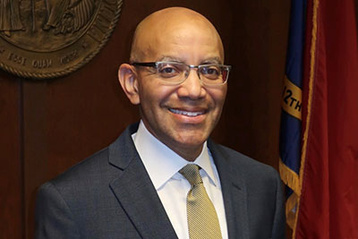GREENVILLE, N.C. (March 21, 2021) — The new president of the North Carolina Community College System said it will lead the state’s economic recovery by providing critical training and education for its diverse population.
Thomas Stith III, who became system president Jan. 11, shared his vision during the Greenville-Pitt County Chamber of Commerce’s Power Luncheon via Zoom last week.
Stith replaced Interim President William Carver and former President Peter Hans, who became president of the U.N.C. System last August.
Prior to his appointment, Stith was district director of the U.S. Small Business Administration, where he led the agency’s response to COVID-19 in North Carolina. He has two decades of experience in public service and business.
Stith said no one should underestimate the role of the 58-college system as the state struggles to recover from the effects of the pandemic. “I see it as an opportunity for our community college system to not only lead recovery but sustain growth — to ensure we have a vibrant economy in the future,” he said.
He commended the efforts of Pitt Community College President Lawrence Rouse to partner with business and industry in the area.
“Under his outstanding leadership, PCC serves as a catalyst to success in Pitt County and throughout the region,” he said.
PCC does this through programs that prepare high school graduates or displaced workers for jobs that need ready trained employees.
PCC is a member of RAMP EAST (Regional Advanced Manufacturing Pipeline for Eastern North Carolina), which provides training to prepare a workforce for advanced manufacturing opportunities, he said.
Stith also said PCC is responding to growth in the pharmaceutical industry.
“With that vision, they are serving a key role in economical development and workforce training in the surrounding area,” he said.
“With companies like Mayne-Pharma and Thermo Fisher Scientific PCC offers a BioWorks certificate. PCC also partners with the N.C. Biotechnology Center Pharmaceutical Network,” he said.
Stith said community colleges are poised to help the economy but must focus on three things.
“First, we need to keep education and training accessible and affordable,” he said. “We should serve as the first choice for high school graduates and displaced workers. I am grounded in the belief that a proper education and training translates into opportunity.”
Second, “we need to be a leader — not only in our state’s recovery from this tragic pandemic, but also the key entity that leads our state forward in economic growth and development.”
Third, “leveraging the diversity of our people across the state, we will become a national model for diversity inclusion,” he said. “As a North Carolina native, I’ve recognized the strength of our state is the diversity of the people. This will be our competitive advantage moving forward.”
He said these goals will be accomplished with collaboration among leadership in the business community, the system office, the state board, the 58 colleges, over 800 trustees, elected officials and the people of North Carolina.
“The importance of receiving support from our legislative leaders cannot be underestimated,” he said. “Without the proper resources, the system cannot serve in our role as the economic engine for our state as we recover and grow.”
His legislative plan consists asking for at least a 5 percent increase in salaries for staff.
“Right now, our community college system employees rank 40th in the country. That is not a place we want to maintain,” he said.
He said it is important to have a stabilization fund, “so we are prepared to provide services, whether worker re-training or two-year associates degree, we have to be economically sound.”
He said the system will continue to build a the year-long marketing effort called “Your Hire Education,” which helps students find an educational pathway to employment they want.
Stith said the system will continue promote the availability of GEER (Governor’s Emergency Education Relief) scholarships, which provide financial assistance to eligible students pursing high-demand workforce training programs in 10 pathways identified by the system and industry partners. “These programs will lead to state and industry recognized credentials, therefore preparing our students and graduates for high-paying jobs in high demand careers.”
With GEER scholarships, “we have a significant funding available for individuals looking for short-term workforce training. It is vitally important for individuals who have been displaced from work and need training now,” he said.
He said the system will also continue to focus on student-employer apprenticeship programs through ApprenticeNC.
“We’ve identified eight to 10 high-growth, high salary industries and opportunities we will continue to focus on — making not only our students aware of the opportunities, but making businesses and industries aware apprenticeship opportunities are available,” he added.
The decline in enrollment during the pandemic was 7 percent in North Carolina compared to 10 percent in other states, he said. Basic skills courses saw the most significant decline. As as the virus abates and on-campus courses return, so will basic skills students, he said.
“There may be potential barriers to participating in a virtual environment (for those students),” he said. “We were able expand broadband and WiFi access to about 20 rural community colleges, but we know there is till work to be done.”
John Chaffee, former president and CEO of the NCEast Alliance, said during the luncheon’s comments period that a Federal Reserve study showed one of the impediments to growth in the region is the lack of qualified applicants to fill even available manufacturing jobs.
Stith said community colleges are addressing the need.
“As we talk about collaboration, our community colleges should serve as the key entity to bring individuals together. K-12 is clearly our pipeline,” he said. “To me, it doesn’t just start in high school. We need to start talking with our middle schoolers and prepare them for potential for careers, amplifying what opportunities we have on our community college campuses.”
Article courtesy of Deborah Griffin
The Daily Reflector
N.C. community college system can lead recovery, new president said

Thomas Stith III, President - North Carolina Community College System
